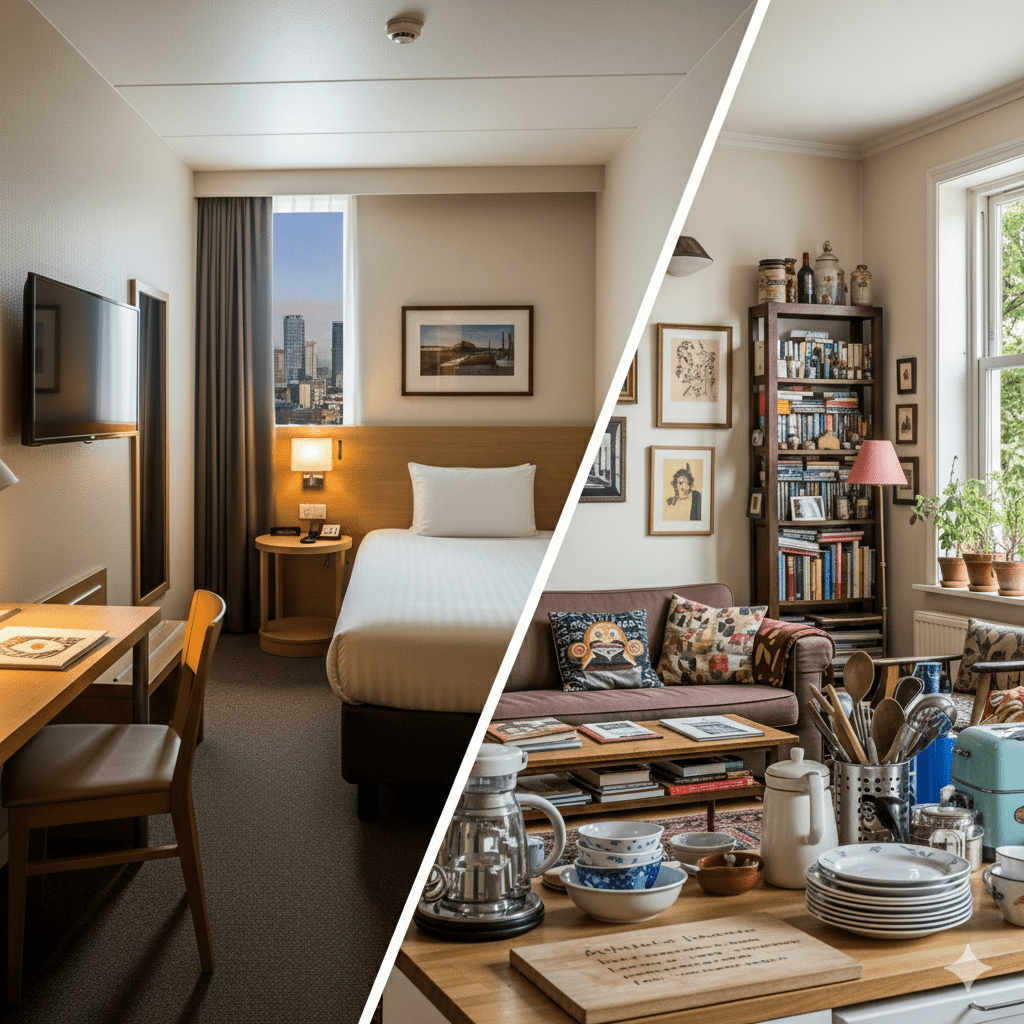When it comes to planning a trip, one of the most important decisions is choosing where to stay. For many years, hotels were the standard option for travelers around the world. But with the rise of Airbnb, travelers now have a completely different choice. Both options offer their own unique advantages and disadvantages. The big question is: should you choose Airbnb or a hotel for your next trip? In this article, we will explore the differences between the two, the pros and cons, and the factors that can help you make the right choice.
The Growth of Airbnb
Airbnb began as a small idea in 2008 when two people rented out an air mattress in their apartment. Over the years, it grew into a global platform with millions of listings in more than 190 countries. The concept is simple: ordinary people can rent out their homes, apartments, or even single rooms to travelers.
The success of Airbnb lies in the fact that it feels more personal and homely. Many travelers prefer Airbnb because it allows them to stay in unique places like treehouses, cottages, or luxury apartments instead of standard hotel rooms. The appeal is also in the local experience. Staying in a neighborhood rather than a commercial hotel zone often gives travelers a chance to live like a local and explore hidden gems.
Why Hotels Remain Popular
Hotels, however, have not lost their importance. They continue to be the most trusted form of accommodation for millions of travelers worldwide. Hotels are especially popular for business trips, short stays, or luxury vacations. The main strength of hotels is reliability. Whether you choose a three-star budget hotel or a five-star luxury property, you know what kind of service and comfort to expect.
Hotels usually provide professional service, daily housekeeping, 24-hour reception, and security. Most of them also have restaurants, gyms, spas, and swimming pools. For travelers who value comfort, convenience, and safety, hotels often remain the first choice.
Comparing Airbnb and Hotels
The differences between Airbnb and hotels are clear once you compare their main features.
- Price:
Airbnb is often more affordable than hotels, especially for long stays or group travel. A family can rent a two-bedroom apartment on Airbnb for less than the cost of two hotel rooms. On the other hand, for solo travelers or short stays, budget hotels can sometimes be cheaper because they include services like breakfast and cleaning. - Space:
Hotels usually offer one room with a bed, bathroom, and sometimes a small seating area. Airbnb, however, can provide much more space, such as an entire apartment with multiple rooms, a kitchen, and even outdoor areas. This makes Airbnb more attractive for families and groups. - Amenities:
Hotels often win in this area. Services like room service, spa treatments, gym facilities, and concierge help are standard in many hotels. Airbnb properties may include a kitchen and laundry but generally lack luxury facilities. - Experience:
Airbnb offers a more local and personalized experience. You can stay in neighborhoods, shop at local stores, and interact with hosts. Hotels provide a more standardized experience, which is consistent but less personal. - Safety and Reliability:
Hotels are regulated businesses, so safety and cleanliness standards are usually guaranteed. Airbnb depends heavily on the host, and while most experiences are good, there can be issues if the property is not as described.
Cost Considerations
Budget plays a big role in deciding between Airbnb and hotels. Let us take an example. Imagine you are visiting Delhi with your family for four nights. If you choose a mid-range hotel, you might pay between 150 to 200 dollars for two rooms. But if you book an Airbnb apartment with two bedrooms and a kitchen, you might pay between 120 to 160 dollars for the same period. The savings increase if you cook some of your meals instead of eating at restaurants.
For business travelers, however, hotels may be more convenient despite being slightly expensive. They can quickly check in, order food, and rely on professional services without worrying about cooking or laundry.
Comfort and Service
When it comes to service, hotels usually have the upper hand. If you face any problem such as a broken air conditioner or missing toiletries, you can call the reception and get help immediately. Airbnb depends on the host, and while many hosts are responsive, the service is not as consistent as hotels.
Hotels also offer daily housekeeping, which many travelers prefer. In contrast, Airbnb usually does not include cleaning during your stay unless you arrange it separately. This can be a drawback for people who prefer not to do chores while traveling.
Who Should Choose Airbnb
Airbnb is a good choice for travelers who want a more personal and flexible experience. Families, groups of friends, and people staying for longer periods benefit the most. It also suits travelers who enjoy cooking their own meals, exploring local neighborhoods, and living like a resident rather than a tourist.
Backpackers and budget-conscious travelers may also find Airbnb to be more cost-effective. The ability to split costs and use kitchen facilities can save a lot of money over time.
Who Should Choose Hotels
Hotels are ideal for business travelers, couples on a short trip, or people who want comfort without complications. If you prefer room service, security, luxury amenities, and the assurance of professional service, hotels are the better choice.
Hotels are also better for those who do not want to worry about responsibilities like cleaning, cooking, or dealing with host instructions. Everything is managed by staff, making it a stress-free experience.
Pros and Cons Summary
Airbnb Pros: Affordable for groups, more space, unique stays, local experience.
Airbnb Cons: Service quality depends on host, not always reliable, limited amenities.
Hotel Pros: Consistent service, luxury facilities, professional staff, high security.
Hotel Cons: Can be expensive, less personal experience, smaller space compared to apartments
Final Thoughts
The Airbnb vs Hotel debate does not have a single answer. Both options serve different types of travelers. If you value affordability, space, and local experiences, Airbnb is an excellent choice. If you prefer convenience, professional service, and reliability, hotels remain unbeatable.
The best way to decide is to think about your travel style. For a business trip, a hotel is more practical. For a family holiday, Airbnb might give you more comfort and savings. Many travelers even mix both options depending on the destination. At the end of the day, the right choice is the one that makes your journey more enjoyable, stress-free, and memorable.
Airbnb is generally cheaper for long stays and group travel because you get more space and can cook your own meals. Hotels can be more affordable for solo travelers or short trips since they include services like daily cleaning and breakfast.
Both are safe if you choose wisely. Hotels have professional security and staff, while Airbnb safety depends on the host and neighborhood. Always check reviews, ratings, and host verification before booking.
Not usually. Hotels provide services like room service, daily housekeeping, gym, and spa facilities. Airbnb offers basic amenities like kitchens and laundry but does not typically include professional services.
Hotels are usually better for business trips because they offer fast check-in, 24/7 reception, Wi-Fi, meeting rooms, and professional services. Airbnb is more suited for leisure and long-term stays.
Both are suitable, but Airbnb is often preferred by families because of the extra space, kitchen facilities, and affordability. Hotels, however, provide convenience and staff support, which some families may prefer.
The main difference is the type of experience. Hotels provide a consistent, professional, and convenient stay, while Airbnb offers a homely, personalized, and often more affordable experience with a local touch.
Read More Blog





Pingback: Best Places to Visit in Europe in 2025 – Top 10 Destinations